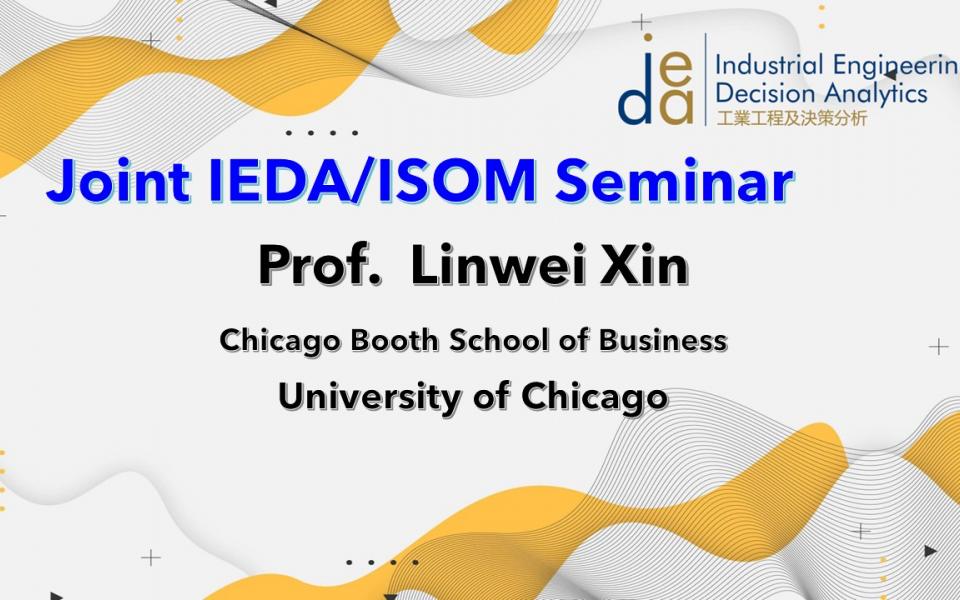Department of Industrial Engineering & Decision Analytics [IEDA Seminar] - VC Theory for Inventory Policies
Supporting the below United Nations Sustainable Development Goals:支持以下聯合國可持續發展目標:支持以下联合国可持续发展目标:
We adopt the supervised learning approach and analyze the learning complexity of several well-known classes of inventory policies, including base-stock and (s, S) policies, by leveraging the celebrated Vapnik-Chervonenkis (VC) theory. Specifically, we apply the concepts of the Pseudo-dimension and Pseudo_gamma-dimension from VC theory to distinguish between inventory policies in terms of their generalizability, that is, the difference between an inventory policy’s performance on training data and its expected performance on unseen data. We prove that the generalization error of (s, S) policies is an order of magnitude higher than that of base-stock policies. This result conveys important managerial insights into the principle of "learning less is more" in inventory management: depending on the amount of data available, learning a base-stock policy with one parameter may be preferable to learning an (s, S) policy with two parameters. That being said, the "learning less is more" principle can be milder in other settings: the generalization error of {S^t} policies, which have non-stationary base-stock levels, is in fact of the same order as base-stock policies despite having linearly many parameters. This translates to the insight that not many samples are needed before it is preferable to learn the more complex policy. Our results hold without making any assumptions on the demand sequence such as independence over time. This is joint work with Yaqi Xie (Booth second-year PhD student) and Will Ma (Columbia GSB).
In the second part (if time permits), I will talk about another paper titled “Balancing Demand Spillover and Lost-Sales under Fulfillment Flexibility” joint with Jingyuan Yang (Booth first-year PhD student) and Yuan Zhong (Booth). One key aspect of inventory management in online retailing is demand spillover, where a stockout at one fulfillment center (FC) leads to demand shifting to another FC. Our research challenges the widely accepted benefits of inventory pooling as described by the square-root law, a concept originally presented in the influential paper by Eppen (1979). This law advocates for efficiency gains through the reduction of system-level safety-stock by pooling inventory across multiple locations. We demonstrate that pooling can also lead to significant spillovers, with the magnitude growing linearly with N (the number of FCs). We further investigate the trade-off between minimizing lost-sales and reducing spillover in two network designs with limited flexibility, and challenge the common wisdom regarding the effectiveness of long chain, a concept related to the design of flexible processes as proposed in the seminal paper by Jordan and Graves (1995). We argue that adopting the design of long chain can significantly increase spillover. In fact, we prove that as we approach the limit of minimizing lost-sales, each unit of reduced lost-sales can lead to as much as $N-1$ units of extra spillover. Our study reevaluates both these established principles due to the implications of spillover in modern online retail contexts, and our results shed light on insights for e-retailers to strike an effective balance between spillover and lost-sales especially given the significant cost implications of spillover.
Linwei Xin is an associate professor of operations management at the University of Chicago Booth School of Business. He specializes in inventory and supply chain management, where he designs cutting-edge models and algorithms that enable organizations to effectively balance supply and demand in various contexts with uncertainty. Xin's research using asymptotic analysis to study stochastic inventory theory is renowned and has been recognized with several prestigious INFORMS paper competition awards, including First Place in the George E. Nicholson Student Paper Competition in 2015 and the Applied Probability Society Best Publication Award in 2019. His research on implementing state-of-the-art multi-agent deep reinforcement learning techniques in Alibaba's inventory replenishment system was selected as a finalist for the INFORMS 2022 Daniel H. Wagner Prize, with over 65% algorithm-adoption rate within Alibaba's own supermarket brand Tmall Mart. His research on designing dispatching algorithms for robots in JD.com's intelligent warehouses was recognized as a finalist for the INFORMS 2021 Franz Edelman Award, with estimated annual savings in the hundreds of millions of dollars. Xin's research has been published in journals such as Operations Research, Management Science, Mathematics of Operations Research, and INFORMS Journal on Applied Analytics.
